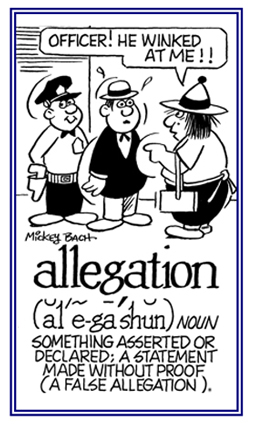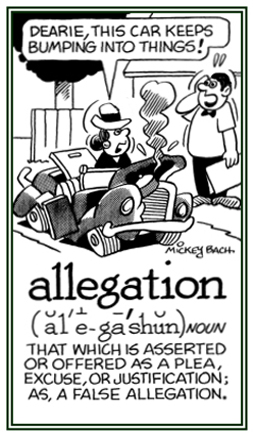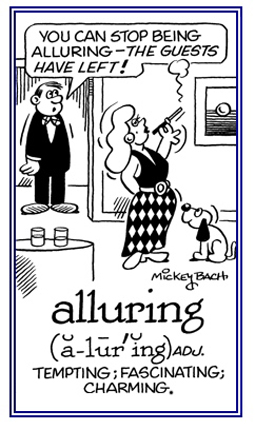English Words in Action, Group A
(a variety of English words which have developed through history and are currently used in our modern age)
Simply click on this banner (or the following link) and you will be on your way to stimulate your brain for greater word comprehension with quizzes based on some of the words in this unit.
The alarmist report from the government agency upset a lot of people.
2. Every one of, each of; the whole number of: All of the people had to be checked in before they could get into the aircraft.
3. Everything, every item; the whole quantity: Is that all that you can carry?

Go to this Word A Day Revisited Index
so you can see more of Mickey Bach's cartoons.
Mark was asked if he could prove the allegations which he presented in the news article that the athletes actually took performance enhancing drugs.


Go to this Word A Day Revisited Index
for a list of additional Mickey Bach illustrations.
Jerome is alleged to have assaulted a man in the parking lot over a parking dispute.
2. To state something without or before proof: The indictment alleges that the senator took bribes for several years.3. To make a plea or present an excuse in support of or in denial of a claim or accusation: The defendant's lawyer alleges that Karl had temporary insanity.
The shooter alleged that he was defending himself against an attacker; however, the person who was shot didn't have a weapon or was there any proof that he was aggressive against the man with the gun.
4. Etymology: supposedly from Latin allegare, "to send for, to bring forth, to name, to produce in evidence"; from ad-. "to" + legare, "to send, to assign" authority or duties to another person.There are inconsistent opinions regarding the origins of allege.

Go to this Word A Day Revisited Index
so you can see more of Mickey Bach's cartoons.
The rare books that the bookstore had recently acquired held a special allure for the bibliophile or book collector.
Promises of a quick way to make money often allures the unwary investor to gamble excessively and to lose a lot of money.
Lower hotel prices and transportation will allure more people to travel.

Go to this Word A Day Revisited Index
so you can see more of Mickey Bach's cartoons.
Links to all of the groups of English words in action, Groups A to Z.
You may see the bibliographic list of sources of information for these words in action.


